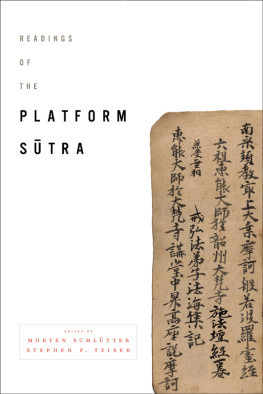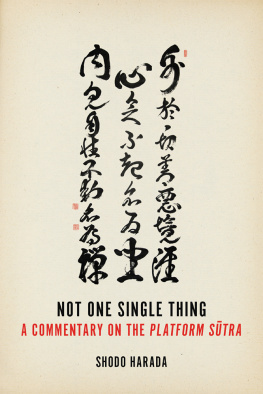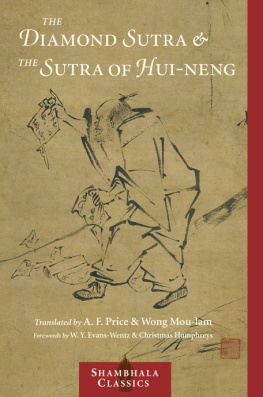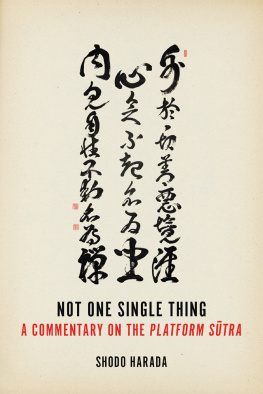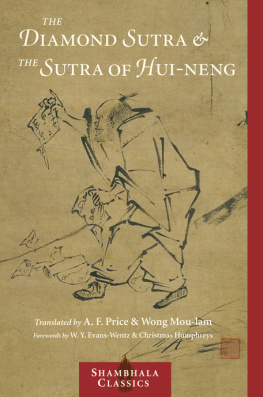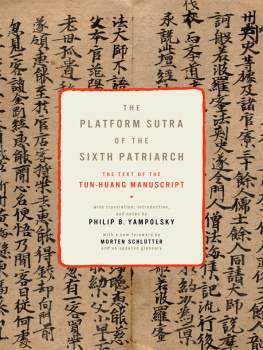Forschergruppe Strukturwandel und Transformation im - Readings of the Platform Sūtra
Here you can read online Forschergruppe Strukturwandel und Transformation im - Readings of the Platform Sūtra full text of the book (entire story) in english for free. Download pdf and epub, get meaning, cover and reviews about this ebook. City: New York, year: 2012, publisher: Columbia University Press, genre: Religion. Description of the work, (preface) as well as reviews are available. Best literature library LitArk.com created for fans of good reading and offers a wide selection of genres:
Romance novel
Science fiction
Adventure
Detective
Science
History
Home and family
Prose
Art
Politics
Computer
Non-fiction
Religion
Business
Children
Humor
Choose a favorite category and find really read worthwhile books. Enjoy immersion in the world of imagination, feel the emotions of the characters or learn something new for yourself, make an fascinating discovery.
- Book:Readings of the Platform Sūtra
- Author:
- Publisher:Columbia University Press
- Genre:
- Year:2012
- City:New York
- Rating:4 / 5
- Favourites:Add to favourites
- Your mark:
- 80
- 1
- 2
- 3
- 4
- 5
Readings of the Platform Sūtra: summary, description and annotation
We offer to read an annotation, description, summary or preface (depends on what the author of the book "Readings of the Platform Sūtra" wrote himself). If you haven't found the necessary information about the book — write in the comments, we will try to find it.
Readings of the Platform Sūtra — read online for free the complete book (whole text) full work
Below is the text of the book, divided by pages. System saving the place of the last page read, allows you to conveniently read the book "Readings of the Platform Sūtra" online for free, without having to search again every time where you left off. Put a bookmark, and you can go to the page where you finished reading at any time.
Font size:
Interval:
Bookmark:
READINGS
OF THE
Platform Stra

COLUMBIA READINGS OF BUDDHIST LITERATURE
COLUMBIA READINGS
OF BUDDHIST LITERATURE
Series Editor: Stephen F. Teiser
This series is published with the sponsorship of the Dharma
Drum Foundation for Humanities and Social Science Research.
Readings of the Lotus Stra,
Stephen F. Teiser and Jacqueline I. Stone, editors
OF THE
Platform Stra
EDITED BY
Morten Schltter
&
Stephen F. Teiser
COLUMBIA UNIVERSITY PRESS
New York

COLUMBIA UNIVERSITY PRESS
Publishers Since 1893
New York Chichester, West Sussex
cup.columbia.edu
Copyright 2012 Columbia University Press
All rights reserved
E-ISBN 978-0-231-50055-5
Library of Congress Cataloging-in-Publication Data
Huineng, 638-713.
[Liuzu da shi fa bao tan jing. English. Selections.]
Readings of the Platform sutra / edited by Morten Schltter and Stephen F. Teiser.
p. cm. (Columbia readings of buddhist literature)
Includes bibliographical references and index.
ISBN 978-0-231-15820-6 (cloth : alk. paper) ISBN 978-0-231-15821-3 (pbk.) ISBN 978-0-231-50055-5 (electronic)
1. Zen BuddhismEarly works to 1800. I. Schltter, Morten. II. Teiser, Stephen F. III. Title.
BQ9299.H854L6213 2000
294.385dc23
2011020758
A Columbia University Press E-book.
CUP would be pleased to hear about your reading experience with this e-book at .
References to Internet Web sites (URLs) were accurate at the time of writing. Neither the authors nor Columbia University Press is responsible for URLs that may have expired or changed since the manuscript was prepared.
The Platform Stra of the Sixth Patriarch is a central text of Zen (in China known as Chan), a school of Buddhism based on the powerful claim that enlightenment can only be attained through a flash of direct, intuitive understanding. The scripture tells the compelling story of an underdog figure named Huineng, portrayed as an illiterate barbarian. The Fifth Patriarch of the Chan school recognizes Huinengs penetrating insight and secretly designates him the Sixth Patriarch. In his sermons in the Platform Stra, Huineng challenges traditional ideas about meditation and enlightenment and seems to debunk all attempts to lay a foundation for religious practice.
The earliest surviving version of the Platform Stra, the focus of the present book, was written in China in the eighth century, a formative period for Chan Buddhism. With its radical approach to Buddhist practice and its claims for the hitherto unknown Huineng as the Sixth Patriarch, the Platform Stra was initially a provocative document. But eventually Huinengs status and teachings became universally accepted, and the Platform Stra was accorded canonical status. The text also proved seminal in other parts of East Asia, where it became extremely important for both monks and laypeople in Korean Sn and later, to a lesser degree, in Japanese Zen. To this day, for readers in Asia and the West, the Platform Stra offers a profound and intriguing statement about enlightenment, meditation, and spiritual cultivation.
Like the other volumes in this series, Columbia Readings of Buddhist Literature, this book is intended to open up the original text to new readers, to spark engagement with the text, and to advance scholarship in the field. The editors asked established experts in the study of Buddhism to write fresh essays for the project. The introduction ( steps back from the text to analyze the way its ideas are related to seminal concepts in early Chinese philosophy.
For our primary text we have chosen one of the earliest handwritten copies of the Platform Stra, probably dating from around 780, discovered in a hidden chamber in the cave-temples of northwest China (near the town of Dunhuang in Gansu Province) early in the twentieth century and now kept in the British Library. We have used the translation of this manuscript by Philip B. Yampolsky as our standard reference; when diverging from it, authors provide their own translation but also refer to Yampolskys, with page or section numbers listed in parentheses. (Yampolskys translation was first published by Columbia University Press in 1967, and a second paperback edition with the same pagination was published in 2012.) An annotated section of the bibliography in this volume lists other English translations of The Platform Stra.
In writing words and book titles in Asian languages, we give the Chinese without special notation, while Sanskrit and Japanese are marked Skt. and Ja., respectively. A character glossary lists the Chinese, Korean, or Japanese characters for terms, figures, and places mentioned in romanization in the text and endnotes; the bibliography provides characters for titles of texts and authors.
We are grateful to many people for their support in putting together this book. We are, of course, especially indebted to the authors who contributed to the volume. After fulfilling their original assignments with enthusiasm, they all responded gracefully and expeditiously to our editorial interventions and suggestions for revision. They have been more than patient, and we appreciate their commitment to making a book that is, we hope, accessible to nonspecialists, useful in the classroom, and of interest to scholars of Buddhism. The anonymous readers of the original proposal and, later, the manuscript provided helpful advice about how to make the book stronger and better organized. Wendy Lochner, senior executive editor at Columbia University Press, has been an unflagging source of support and wisdom. We also wish to register our thanks to the other staff at Columbia University Press, including Christine Mortlock, assistant editor; Leslie Kriesel, copyeditor and production editor; and to Mary Mortensen, who compiled the index.
The Dharma Drum Foundation generously supported our work on this volume, and we are grateful to its founder, the late Venerable Sheng Yen (19312009), and its chief executive officers, Tseng Chichun and recently Lee Shen-yi, for their continuing help with this project.
Our families have sustained us over the four years we have been editing and writing this book, and as always we are grateful for their patience and support.
READINGS
OF THE
Platform Stra

MORTEN SCHLTTER
The Platform Stra is a formative scripture of the Chan school (known in Japan as Zen) and one of the most popular texts ever produced in Chinese Buddhism. It has been widely read in East Asia for twelve centuries by both monastics and laypeople, and in recent decades it has also become well known in Europe and the English-speaking world in translation. Through its dissemination in the modern world, the Platform Stra has become increasingly important as a statement of Chan/Zen in the West as well as in East Asia, where a renewed interest in Buddhism has resulted in many new adaptations and studies of the text and its main protagonist, Huineng (638713), the legendary Sixth Patriarch of Chan.
The present volume focuses on the earliest surviving version of the Platform Stra, a manuscript discovered near the oasis town of Dunhuang in northwestern China, which probably dates to around 780, although it may have been preceded by earlier editions now lost. The powerful ritual of bestowing formless precepts no doubt added much to the early appeal of the text. As Paul Groners chapter in this book demonstrates, taking vows or precepts was central to Chinese Buddhist practice for both laypeople and monastics.
Next pageFont size:
Interval:
Bookmark:
Similar books «Readings of the Platform Sūtra»
Look at similar books to Readings of the Platform Sūtra. We have selected literature similar in name and meaning in the hope of providing readers with more options to find new, interesting, not yet read works.
Discussion, reviews of the book Readings of the Platform Sūtra and just readers' own opinions. Leave your comments, write what you think about the work, its meaning or the main characters. Specify what exactly you liked and what you didn't like, and why you think so.

